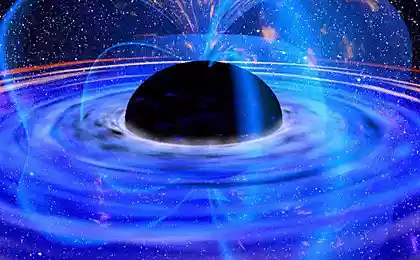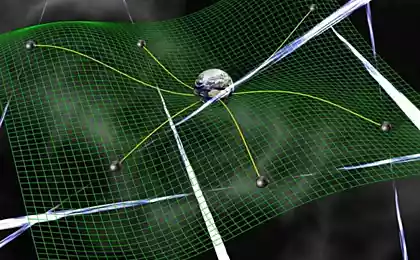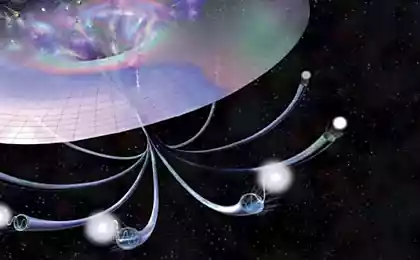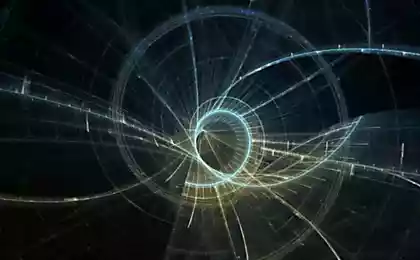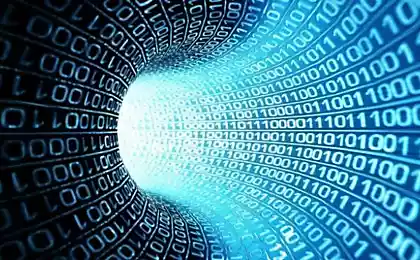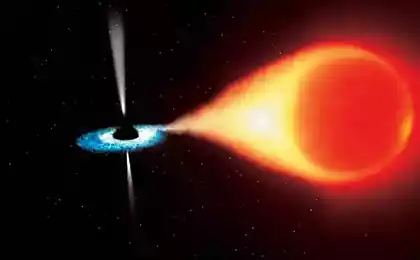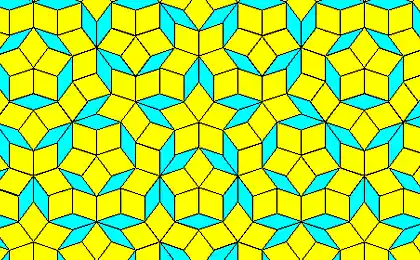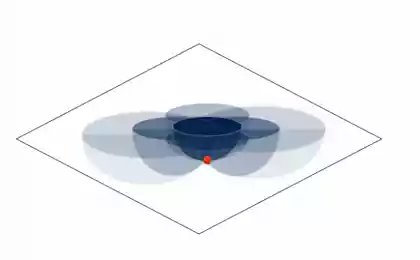513
What is the conflict of General relativity and quantum mechanics
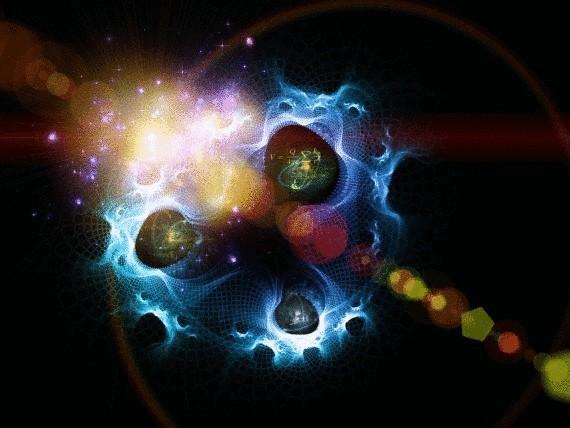
Despite our successes in the job description of the internal mechanisms of the universe, in our knowledge, some gaping hole. Where the Grand unified theory or General theory? Why the General theory of relativity contradicts quantum mechanics? Why we want to combine them?
Almost everything we know about physics, can be put into two basins. One is quantum mechanics, based on which we developed the Standard model, including all the fundamental particles we have discovered, as well as three of the four interactions: electromagnetism, weak and strong nuclear forces.
In another basin lies Einstein's General theory of relativity, which describes the fourth force, gravity, and gives us black holes, the expansion of the Universe and the potential for time travel.
These basins can be combined into one? We often say that General relativity does not work with quantum mechanics. Narrow-minded people did say that "Einstein was wrong" and begin to draw conclusions, "and therefore, the speed of light is not the maximum". Why is it so?
We should mention that no one knows exactly how quantum mechanics and General relativity come together in a theory of "quantum gravity". And although there are some interesting ideas, which we try to describe to begin with, why do we need a theory of quantum gravity.
Two kingdoms
Quantum mechanics and relativity work on completely different scales. Quantum mechanics, for example, was unknown to science for so long because of importance only in atomic scale. If you're smart, you can imagine where quantum mechanics governs the fate of the cats, but this is an example of a stretch.
Relativity, on the other hand, becomes important only in strong gravitational fields. Time, for example, is slowed down near the Earth's surface compared with the time of distant space; the light is bent around galaxy clusters. These effects are largely ignored, unless we are talking about the surfaces of neutron stars, and similar things. In other words, the General theory of relativity is that space and its effects are measured in appropriate scales — from stars to the universe.
However, there are very interesting corners of spacetime where General relativity and quantech face.
Black holes usually are an excellent astrophysical laboratories, primarily because they are both small and possess a powerful gravitational field. First attempt successful connection the gravitational and quantum effects manifested at the boundaries of black holes in the form of the famous Hawking radiation, which will completely vaporize any black hole (quadrillions of years) and will lead to an inevitable heat death of the Universe.
Outside we are fine. But as we move further and further into the center of a black hole, we have less and less knowledge about how physics works really.
Singularity
Once you drop something into a black hole beyond the event horizon, it not only cannot escape, but will inevitably sassano inside. The result of this is that in a world with a single king — gravity — everything that goes into a black hole shrinks to infinitely small and infinitely dense point literal, the so-called singularity. At the moment of the Big Bang, the same problem was incredibly high density (due to strong gravity) encased in a very small space. In the first moment is assumed to be infinitely small space.
We never saw the so-called "naked singularity" directly (and there is good reason to believe that will never see), which is not very good for understanding this phenomenon, but good enough terms not to be broken under the influence of tidal gravitational forces.
From the picture of General relativity implies that the core black holes have literally zero radius, but quantum mechanics says something very different. In quantum mechanics is the "uncertainty principle", which, among other things, States that you will never be able to determine the exact position of something. In practice, this means that even what we call "particles" can not be arbitrarily small. According to quantum mechanics, mass, for example, our Sun can never be contained within a region less than 10-73 M.
Infinitesimal, but not zero.
If this were the only clash between quantum mechanics and gravity (Yes, many of you already knew that), it would be possible to forgive people's frustration from the extent of the problem. But the most severe conflict between General relativity and quantom starts deeper than 10-73 M.
Classical and quantum theory
The General theory of relativity known as the classical field theory which describes the universe as a continuous distribution of numbers — the exact numbers, if your tools precise enough to measure them, who will tell you all about the curvature of space and time. Curvature, in turn, completely describes the distribution and movement of mass and energy. I quote John Wheeler:
"Mass tells space-time how to bend and space time tells mass how to move".
But quantum theory is quite different. In quantum theory, particles interact by sending between particles. Electricity, for example, sends photons between charged particles, the strong interactions involve gluons, and the weak — W and Z-bosons.
We don't even need to dive into the black hole to see the conflict between the classical and quantum theories. Consider the famous experiment "double-slit". A beam of electrons (or photons, or other particles) fired through a screen with two thin slits on it. Due to quantum uncertainty it is impossible to predict through which of the slits the electron will pass. And he flies through two slits. It's like cheating, but in the context of gravity, it is even more ingenious. If the electron passes through one slit, it definitely creates a gravitational field different from that which occurs when passing through the other slit.
Everything becomes even more strange when you realize that according to the experiment Wheeler's delayed choice, it becomes possible to configure an experiment so that when you launch it, you can retrospectively observe the system and make the electron pass through one slit or the other (though you cannot choose through which).
Gravity world should be completely deterministic, but quantum mechanics — quite the contrary.
There is another deep problem. Unlike electricity, which only affects charged particles, gravity affects everything. All forms of mass and energy interact with gravity and create gravitational fields. And unlike electricity, there is no negative mass, which would negate the positive.
We can imagine a quantum theory of gravity in principle. As with other forces, the particle-intermediary called the graviton, which bore the signal.
We could provide smaller scale and see how more and more virtual gravitons scurry between the particles. The problem is that on smaller scales increase energy. The nucleus of an atom requires more energy to break apart than the removal of an electron from orbit, for example.
On a small scale swarm of high-energy virtual gravitons will produce an incredibly dense energy, and this is where the problems begin. Gravity is supposed to observe all forms of energy, but here we are going to produce an infinite number of high-energy particles, which will create a powerful gravitational field. You might see what the difficulty is. By the end of the day, all the calculations have come to a whole bunch of infinities flying around.
In electromagnetism and other interactions quantum calculations begin to stumble on a very small scale, known as the "Planck length", about 10-35 m is much smaller than an atom. Paying tribute to the tradition, note that physicists have no idea about the physics on scales less than the Planck length. At these scales, quantum mechanics says, you can experience black holes, there is an accident, and the space-time is dimpled, when you look at him so close. There's a brave new world.
We try to avoid these clashes of theories through a process known as "renormalization". Renormalization is just a funny way of expressing that we perform calculations up to a certain scale and then stop. This allows you to get rid of infinities in most theories and just breathe. Since most forces include only the differences between the two energies does not matter, you calculate the total number or not.
However, not everyone is so optimistic looked at it. The great Richard Feynman noted:
"The game that we play, technically called "renormalization". But no matter how clever the word, it is not called, I think it is a crazy process. Resorting to such focus-pocus, we cannot prove even to themselves that the theory of quantum electrodynamics is mathematically self-sufficient. What is surprising is that this self sufficiency is not proven to date, and I suspect that renormalization is not mathematically legitimate."
Drop these objections. Things get even worse when we talk about gravity. The fact is that because (unlike electromagnetism) gravity affects all particles, infinite energy will mean different curves. Renormalization even in the best case will not work. We get rid of infinities.
What do we know?
We have no theory of quantum gravity, but there are some ideas on what should be a successful theory. For example, should be the graviton, since gravity appears to be spreading to the whole space, the graviton (like the photon) must be massless. Carry weight (as W and Z bosons) are only a short distance away.
But that's not all. It turns out that there is a unique connection between classical and quantum theory. For example, electromagnetism give rise to electric charges and currents. Sources are mathematically described as vectors, and it turns out that the vectors generate the particle-mediator with spin 1. It turns out, the mediators with the odd spin will produce forces that will push away same particles. Indeed, two electrons repel each other.
General relativity, on the other hand, is known as a "tensor theory", because it has all kinds of sources pertaining to pressure, flow and density distribution. The quantum version of the tensor theory will have particles-mediators with spin 2. As you might imagine, the graviton is spin 2. And you guessed it, these particles will be attracted. Oddly enough, the particles attract each other gravitationally.
We know little about what needs to be gravitons. But what to do with all these infinities, nobody knows.
Source: brainswork.ru
The ban on talking on the phone does not make the roads safer
Solar modules come from Novocheboksarsk





